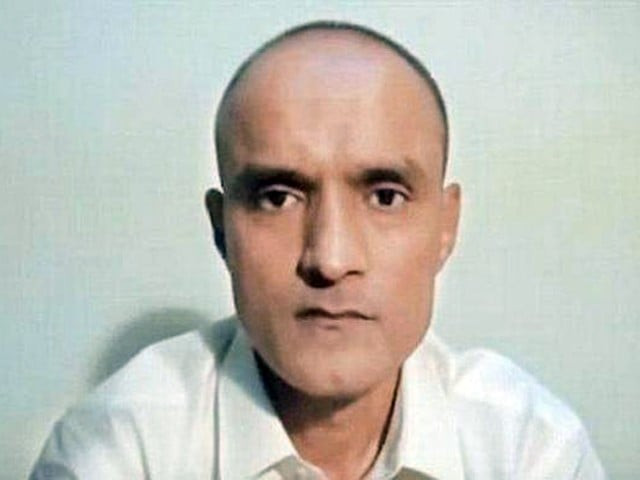Pakistan complies with ICJ verdict on Indian spy Jadhav
Abides by international court's decision to provide consular access

Kulbhushan Jadhav was arrested on March 2016 in Balochistan. PHOTO: FILE
International law expert Barrister Taimur Malik while talking to The Express Tribune said, "Pakistan has complied with the ICJ's verdict by granting consular access to Jadhav."
He said the fact that India agreed to the terms of the consular access, went ahead with the meeting and didn't immediately raise any legal issues over the aspects of the meeting showed that Pakistan's good faith, despite the current environment, and complied with the ICJ judgement.
Another senior lawyer believed that there was no clear provision for giving consular access to Jadhav for the second time as the law was silent in this regard.
Another aspect of the ICJ ruling was to give an "effective review" of Jadhav's conviction, which would also be challenge for Pakistan. It is learnt that the government legal minds were considering different options to fulfil this aspect of the ICJ verdict.
Senior lawyers believed that the government of Pakistan should itself approach the high court against Jadhav's conviction in order to fulfil the ICJ's directives for an effective judicial review.
Jadhav admits working for RAW during consular access
It is also learnt that the Indian embassy in Islamabad had contacted a couple of Pakistani lawyers to plead Jadhav's case before the court of law.
Renowned international law expert Ahmar Bilal Soofi said Pakistan had various options to fulfil its obligation to conduct an "effective review", adding that a special bench could be constituted to hear the matter while a committee consisting local and international experts might be constituted to ensure a fair trial.
The ICJ in its judgement had directed Pakistan to take all measures to provide an effective review and reconsideration, including, if necessary, by enacting "appropriate legislation".
The court said the obligation to provide effective review and reconsideration could be carried out in various ways and the choice of means was left to Pakistan.
The ICJ asked Pakistan for an "effective review and reconsideration of the conviction and sentence of Mr Jadhav" so as to ensure that full weight was given to the effect of the violation of the rights set forth in Article 36, Paragraph 1, of the Convention and guarantee that the violation and the possible prejudice caused by the violation were fully examined. Likewise, the ICJ had also maintained stay on the execution of Jadhav till "effective review".
The court pointed out that respect for the principles of a fair trial was of cardinal importance in any review and reconsideration, and that, in the circumstances of the present case, it was essential for the review and reconsideration of the conviction and sentence of Jadhav to be effective.
The ICJ considered that the violation of the rights set forth in Article 36, Paragraph 1, of the Vienna Convention, and its implications for the principles of a fair trial, should be fully examined and properly addressed during the review and reconsideration process. In particular, any potential prejudice and the implications for the evidence and the right to defence of the accused should receive close scrutiny during the review and reconsideration, it added.
The ICJ noted that, according to Pakistan, the high courts of Pakistan could exercise review jurisdiction. The court observed; however, that Article 199, Paragraph 3, of the Constitution of Pakistan had been interpreted by the Supreme Court as limiting the availability of such a review for a person who was subject to any law relating to the armed forces of Pakistan, including the Pakistan Army Act of 1952.
‘Under pressure’ Jadhav parroted Pakistan’s stance, claims India
The judgement stated the Supreme Court stated that the high courts and the Supreme Court might exercise judicial review over a decision of the Field General Court Martial on "the grounds of coram non judice, without jurisdiction or suffering from mala fides, including malice in law only" (Said Zaman Khan et al vs Federation of Pakistan, Supreme Court of Pakistan, Civil Petition No 842 of 2016, 29 August 2016, Para 73). Article 8, Paragraph 1, of the Constitution provided that any law which was inconsistent with fundamental rights guaranteed under the constitution was void, but this provision does not apply to the Pakistan Army Act of 1952 by virtue of a constitutional amendment (ibid, Para 125).
However, the ICJ noted that it was not clear whether judicial review of a decision of a military court was available on the ground that there had been a violation of the rights set forth in Article 36, Paragraph 1, of the Vienna Convention.
The ICJ also referred to the Peshawar High Court's last year verdict, wherein it was held that the high court had the legal mandate positively to interfere with decisions of military courts if the case of the prosecution was based, firstly, on no evidence, secondly, insufficient evidence, thirdly, absence of jurisdiction, finally malice of facts and law. The government of Pakistan had appealed the decision and the case was still pending at the close of the oral proceedings in the present case.
The court also took full cognisance of Pakistan's counsel oral arguments that the Constitution of Pakistan guaranteed, as a fundamental right, the right to a fair trial; that the right to a fair trial was "absolute" and "cannot be taken away"; and that all trials were conducted accordingly and, if not, "the process of judicial review is always available".
The counsel for Pakistan assured the court that the high courts of Pakistan exercised "effective review jurisdiction", giving as an example the decision of the Peshawar High Court.



















COMMENTS
Comments are moderated and generally will be posted if they are on-topic and not abusive.
For more information, please see our Comments FAQ